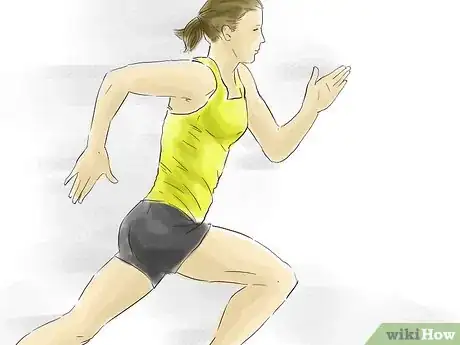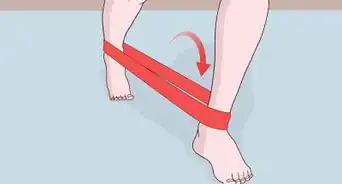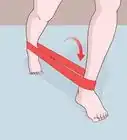wikiHow is a “wiki,” similar to Wikipedia, which means that many of our articles are co-written by multiple authors. To create this article, 108 people, some anonymous, worked to edit and improve it over time.
There are 8 references cited in this article, which can be found at the bottom of the page.
wikiHow marks an article as reader-approved once it receives enough positive feedback. This article received 13 testimonials and 96% of readers who voted found it helpful, earning it our reader-approved status.
This article has been viewed 289,545 times.
Learn more...
People usually get nervous when running in a road race or a cross country race. If you do, it's OK, because then most people get extra boosts of adrenaline; however, confidence is the ultimate key to success. There are ways to keep yourself thinking positive when running, especially if you're not a good runner. Keep on practicing until you are better than before.
Steps
-
1Remember that preparation is crucial. Hydrate very well and eat healthy the days before the race, and get some good nights' sleep. Prepare yourself psychologically in bed the night before- envision the course in your mind.
-
2Eat a good breakfast (full of fibre, protein ,carbohydrates and sugars) , but make sure you have several hours to digest it or else you'll get a stomach cramp. Be sure to eat a moderate meal 2-4 hours before the race. If you have a slow digestive system, eat light. The objective is to not get a stomach cramp, but also to not be hungry and devoid of energy. Keep hydrating the day of the race, but again, make sure you have time for it to go through your body or you'll get one of those nasty side-aches. Don't drink Gatorade before a race![1]Advertisement
-
3Double tie your running shoes so when you're running your shoes will not come untied. Wearing Racing Spikes is a good idea in the race since they are lighter and have more tread than normal running shoes. Make sure they feel good and not too tight. Having them too tight is just as bad as not having them tied at all.[2]
-
4At the start of the race, stay with the pack. Once you lose sight of them, it will be psychologically hard to get back up to them, as you don't know how far ahead they are. But also remember that most Cross Country runners take off too fast, and don't intend to hold their first half mile pace the whole way.[3]
-
5Move through the first 800 meters pretty fast to make sure you get everything out of yourself - then you can tap into your full potential. Also, you will have the added benefit of running with the adrenaline still in you, so you might as well use it. It not wise to sprint early in the race, rather start with a brisk 3/4 pace to get a good position in the pack. As the runners thin out you will begin to gain on those ahead of you. [4]
-
6Look for key "landmarks" on the race. (e.g. a mile mark or a downhill), you may want to try the surge. To do this, run about 60 to 90 seconds faster (per mile pace) for about 50 meters. Then, settle back down to "normal" pace. This strategy helps break out of the natural "slow-down-without-even-knowing-it" obstacle in a race by overriding the chemical in the brain that automatically shuts down your muscles "without your permission."
-
7If your legs start to hurt, don't slow down. As this will make them hurt more. If you run, you actually can't feel them anymore. But if they don't stop hurting, you might want to stop and ask one of the paramedics there if there are any.
-
8When your legs get tired, pump your arms; remember that your legs cannot outrun your arms. Obviously, since they're attached to your body. You might notice your arms getting a little sore. If they get very sore (your arms), swing them, but minimally. Pump your arms as hard as you can going up a hill, since your legs will be very, very tired going up and pumping your arms will help them go up faster.[5]
-
9Make competitive goals during the race like "I'm going to catch the kid in the red". After you catch that kid, make a goal about the kid in front of you and so on.
-
10Keep your pace strong. When there are people cheering you on, use it as an advantage to boost your self-esteem. Don't ever talk negative to yourself, or you race will end up terrible.
-
11On downhills, you should let gravity bring you to a sprint. You may end up passing a couple people and leaving them behind this way. Uphills and other difficult places in races are also good places to leave people behind in races.
-
12Finish strong. When you are at the last 100-200 meters, sprint and use the rest of your energy to finish.[6]
-
13Never slow down before you get to the finish line! Try to do everything you can to get there as fast as you can. Sometimes your legs already know how to do this, especially if you have implanted brains in them that have your legs self-programmed to kick at the end.
-
14Sprint past the finish line so you don't slow down before the line and get a slower time. Also, If you don't, the kids behind you will probably run into you and begin to scream obscenities.
-
15Congratulate your team even if they had a bad race, team spirit makes all the difference!
-
16If you do not come first, that's totally fine. There can only be 1 winner, and your personal goals and times are the things that really matter. Good sportsmanship goes a long way.
Community Q&A
-
QuestionWhat should I do if my breathing gets really bad?
 Community AnswerTry to even out your breathing so that you are taking 2-3 breathes every couple of steps. Slow down a little if you have to in order to get control of your breaths. You don't want to have super rapid breathing because that can cause you to get cramps.
Community AnswerTry to even out your breathing so that you are taking 2-3 breathes every couple of steps. Slow down a little if you have to in order to get control of your breaths. You don't want to have super rapid breathing because that can cause you to get cramps. -
QuestionHow do you keep up my adrenaline?
 Community AnswerSleep well the night before the race. Make sure you have had a nutrient-rich breakfast for sustaining energy. Keep stretching before the race. Give yourself plenty of pep talks. You can do this, yes you can!
Community AnswerSleep well the night before the race. Make sure you have had a nutrient-rich breakfast for sustaining energy. Keep stretching before the race. Give yourself plenty of pep talks. You can do this, yes you can! -
QuestionWhat if I am really tired?
 Community AnswerSlow down your pace but do not stop. Give yourself a pep talk, take a deep breath, and keep on going.
Community AnswerSlow down your pace but do not stop. Give yourself a pep talk, take a deep breath, and keep on going.
Warnings
- Always be aware of obstacles as it ranges from creeks, rocks, rough-ground so you won't sprain an ankle or worse..⧼thumbs_response⧽
- Don't ever get discouraged and feel the urge to quit or give up the race just because you know you are not going to win the race.⧼thumbs_response⧽
- At the beginning of a race, don't go into a dead sprint for more than 30 meters. You'll only die out the first half km/mile.⧼thumbs_response⧽
- Don't eat or drink anything in large quantities the hour before your race.⧼thumbs_response⧽
- Beware of being boxed in at the beginning! It is awfully surprising how much can be lost here! To avoid this, take off like a sprinter immediately after you are positive the gun has been shot, and run at nearly 100% for 20-30 meters to get ahead of everyone; then, settle down to your true race pace.⧼thumbs_response⧽
Things You'll Need
- Proper running shoes.
- Good training.
- Goals.
- A pace keeper (someone to shout out times, stopwatch, etc.)
- Another person to run with (to keep you going).
- Good quality sport/training clothes
References
- ↑ https://www.pennmedicine.org/updates/blogs/musculoskeletal-and-rheumatology/2018/august/pre-race-day-tips-preparing-for-a-half-marathon
- ↑ https://www.runnersworld.com/health-injuries/a27009861/how-to-tie-running-shoes/
- ↑ https://www.runnersworld.com/training/a20859532/marathon-pacing-and-pack-running/
- ↑ https://www.runnersworld.com/training/a20825636/cross-country-specific-training-tips/
- ↑ https://jeb.biologists.org/content/217/14/2456
- ↑ https://www.runnersworld.com/training/a20794716/finish-strong-in-every-race/
- ↑ https://www.pennmedicine.org/updates/blogs/musculoskeletal-and-rheumatology/2018/august/pre-race-day-tips-preparing-for-a-half-marathon
- ↑ https://runnersconnect.net/how-to-breathe-when-running/
- ↑ https://www.pennmedicine.org/updates/blogs/musculoskeletal-and-rheumatology/2018/august/pre-race-day-tips-preparing-for-a-half-marathon

















-Step-16-Version-2.webp)



















-Step-16-Version-2.webp)




































